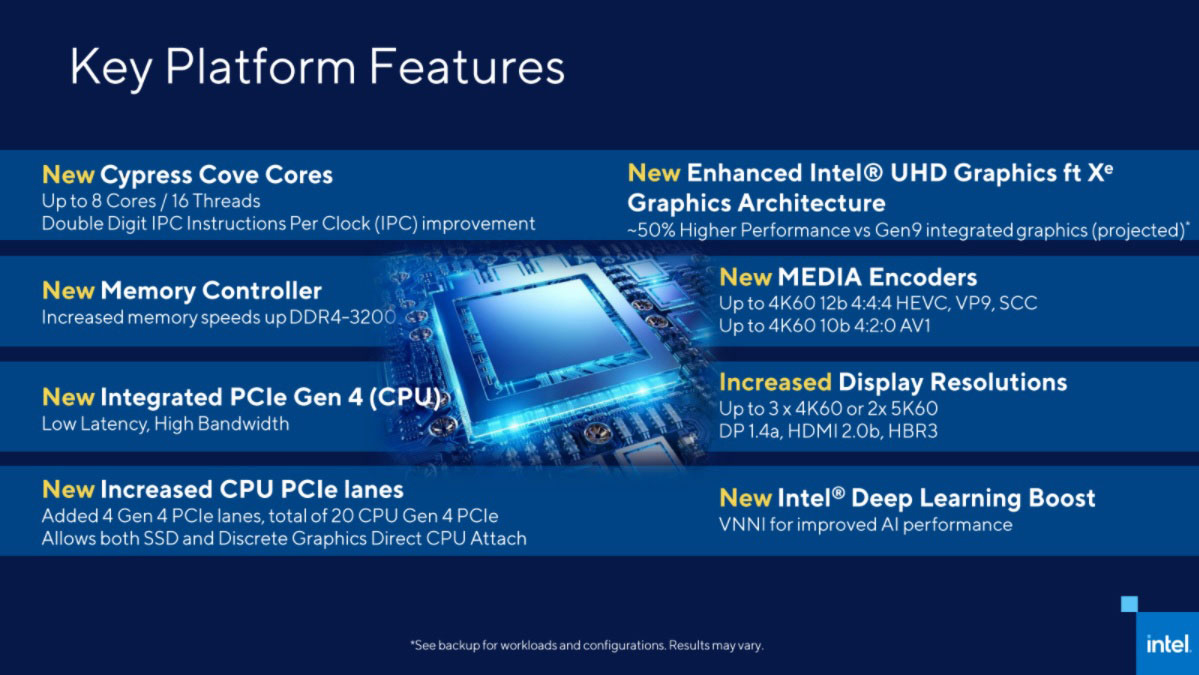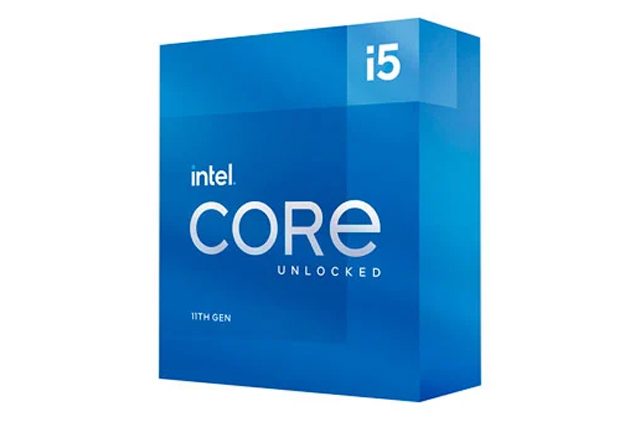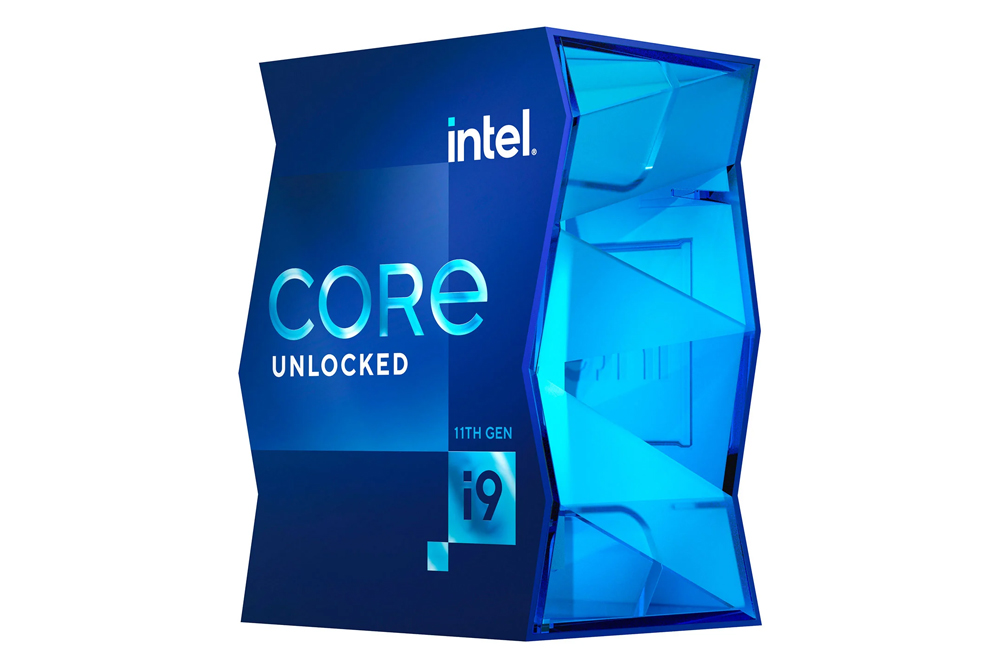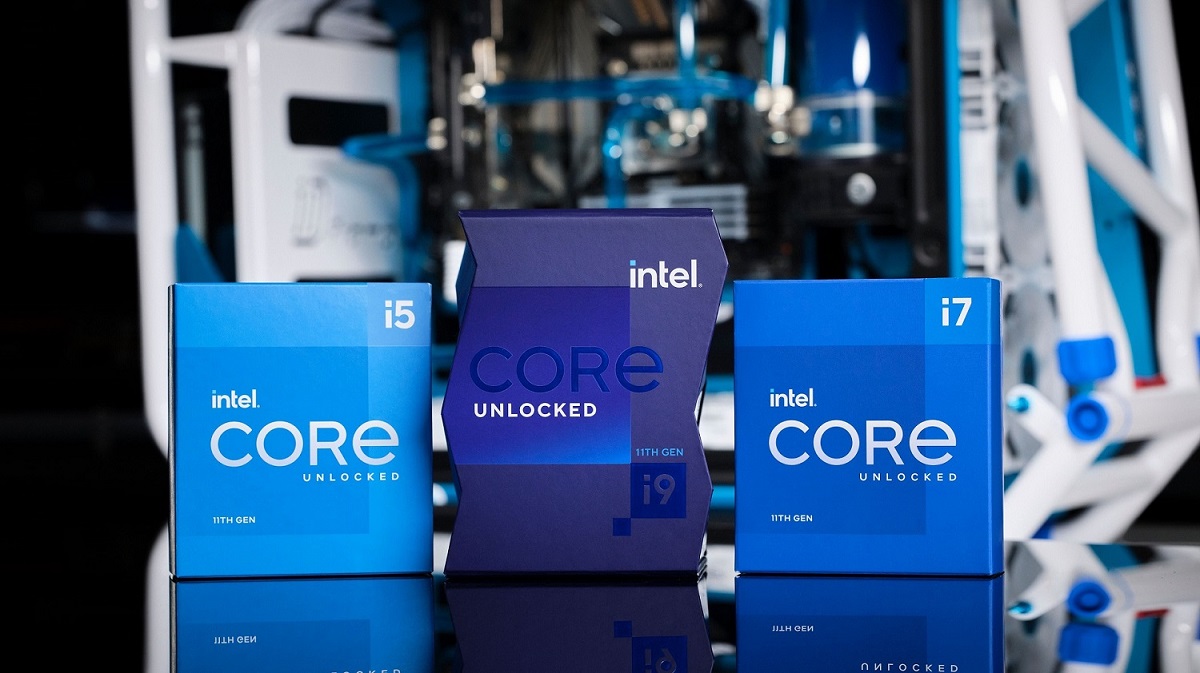After months of hype and waiting, Intel’s 11th-generation Rocket Lake CPUs are finally here. They pack a backported 10nm Ice lake architecture into the mature 14nm Intel process, leading to the best gaming performance we’ve ever seen from Intel CPUs. As is often the case, though, you don’t necessarily need to buy the most expensive processor to get the best gaming CPU.
If you’re buying the best 11th Gen CPU for Gaming, which Intel CPU should you get?
Picking an 11th Gen CPU

Although Intel consistently improves its Core i3 CPUs, the best gaming performance can be found in its Core i5, Core i7, and Core i9 models. The value for money is concentrated in the middle, where you’ll get the best bang for your buck, but there are reasons you might want to opt for a higher power CPU – especially if your budget gives you the room for a top-tier graphics card too.
But what about all the different Intel CPUs within those core ranges? Intel has a lot of suffixes which can make picking a processor a little confusing. The first you want to keep an eye out for is Intel’s “K” series processors. These are its high-performance options, which not only come packing the highest quality silicon, but they feature unlocked multipliers for overclocking.
Intel processors, especially those in the mid-range, have often been fantastic overclockers, letting you unlock a lot of additional performance if your cooler can handle it. If you’re interested in making the most of your money and getting the best gaming performance at your price point, Intel’s K processors, like the 11600K, are a great choice.
Don’t fancy doing the overclocking yourself? Not a problem. Chillblast offers a bespoke overclocking service with every gaming PC build. Just ask your Chillblast system expert about overclocking, and we’ll give you an estimate of how much extra performance you can expect from your custom gaming PC.
Some of Intel’s CPUs are also available in “F” variants. These are chips without the onboard graphics present in every other Intel Core CPU. If you’re looking to build a gaming PC, then you’ll also need a dedicated graphics card, making the onboard GPU with Intel CPUs only really useful for troubleshooting purposes. For the best value for money, Intel’s KF CPUs combine the powerful overclockability of its K series, with the slightly lower cost of its F series CPUs.
i5, i7 or i9 11th Gen CPU for Gaming?
All Intel 11th-generation CPUs benefit from the new Cypress Cove architecture, leading to increased instructions per clock and much improved per-core performance. As with previous generations, though, there are big differences between what each tier of 11th-generation CPU can offer.
Core i5 Rocket Lake processors are all 6 core, 12 Threads. The Core i5 11400F, can boost up to 4.4GHz, while the more capable i5-11600K can go as high as 4.9GHz on a single core, or up to 4.6GHz across all of its cores.
Core i7 models up the ante to 8 Cores and 16 Threads, with the flagship Core i7-11700K and 11700KF hitting boost clocks of up to 5.0GHz on a single core, and up to 4.6GHz across all cores simultaneously.
The Core i9-11900k and 11900KF come with the same 8 Cores and 16 Threads as the Core i7 models. That’s a step down from the 10900K, which offered 10 cores, and is an unfortunate side effect of the Cypress Cove architecture. What’s lost in multi-core potential, however, is gained in single core performance. The 11900K and KF models can boost up to 5.3GHz on a single core, and 4.8GHz on all cores at once.
High clock speeds, and big improvements to instructions per clock, mean all of these CPUs are fantastic for all sorts of tasks, but particularly gaming. When paired with an appropriate graphics card, there’s nothing they can’t handle at high detail settings and high frame rates. Where they really stand apart, however, is value for money, multitasking performance, future proofing, and overclocking.
We won’t go through all the bells and whistles that the new generation comes with here. Here’s our full round-up on everything new with the 11th Generation of Intel CPUs if you want to deep dive into their range of features and improvements over the 10th-generation.
But here’s a closer look at each of the best chips of their respective CPU tiers, to see why you might want to aim for one particular chip over another with Intel’s new Rocket Lake generation.
i5 11400F – The Best Budget Gaming CPU
Intel’s entry-level gaming processors have always offered solid bang for buck, but rarely like that of the new Core i5-11400F. This affordable gaming processor packs the same six cores and 12 threads of its more capable cousin, the 11600K, but with a reduced clock speed. Despite that lower boost clock, when paired up with a capable graphics card there isn’t a huge difference in their performance (at least at stock).
Without the unlocked multiplier, you won’t be able to enjoy any overclocking capabilities, and as an F series chip, there is no on board graphics, but it’s a solid all-round gaming processor and offers excellent out of the box performance at a very affordable price.
i5-11600k – Great for Gaming

Like its mid-range predecessors, the Core i5-11600K is the sweet spot of Rocket Lake processors, offering comparable gaming performance to the most powerful CPUs in the world, at a fair price. Even with the most powerful graphics cards on the market, the i5-11600k isn’t going to bottleneck your performance, meaning that your in-game frame rate will be far more dependent on the budget you can apply to the graphics card.
With six cores and 12 threads, and the ability to boost up to 4.9GHz on a single core (4.6GHz all-core), it offers stupendous gaming performance and decent multi-tasking capabilities if you want to do a little video editing or other productivity work when you’re not gaming.
If you’re a serious streamer, or expect to transcode a lot of video, you might want to opt for a CPU with more cores, but for raw gaming ability, the 11600K is hard to beat. You can get a little extra performance from turning off power limits and increasing the multiplier too, netting higher all-core boost clocks, and possibly even hitting 5GHz on a single core.
If you’re interested in improving the performance of your Core i5-11600K beyond stock, be sure to ask your Chillblast sales representative about our custom overclocking service. It’s free, and doesn’t invalidate your warranty.
i7-11700K – Good for More than Gaming.
If you want maximum gaming performance and some extra cores for increased power in productivity tasks like video editing, or plan to stream and game at the same time, the Core i7-11700K is the ideal Intel processor. It has all of the high performance capabilities of the 11600K, and is fully unlocked for overclocking too, but offers it across eight cores. It also supports Intel’s Turbo Boost Max 3.0 algorithm, letting it hit up to 5.0GHz on a single core right out of the box. Its all core boost remains the same at 4.6GHz, however.
The real difference is it’s an eight core and 16 thread CPU, delivering a huge difference in video editing and other intensive multi-threaded tasks. Intel has put a lot of effort into making its processors Content Creator friendly, and the i7 and i9 are no different. The i7-11700K processor opens-up the ability to stream and record whilst playing games, and gives you the horsepower to edit and render those clips afterwards.
It’s also a more future-proofed processor. New-generation Xbox and PlayStation consoles are built with eight core CPUs, meaning future games will be made with that sort of hardware in mind. We’ve already seen some games that can take advantage of up to 10 threads at once, so it may not be long before CPUs that support up to 16 threads show a noticeable performance advantage.
i9-11900K – Everything you need and more

Unlike the Core i9-10900K, which separated itself by offering two more cores than the 10700K, the 11900K is still an eight core CPU. Where it differentiates itself, is in its raw performance and boost algorithms. All eight cores can reach 4.8GHz at once, and if you can keep its temperature down, the Velocity Boost algorithm lets it hit 5.3GHz on a couple of cores at once for massive single-threaded performance.
Although not hugely faster than the 11700K (or even an overclocked 11600K) for gaming, the Core i9-11900K is still the most powerful mainstream processor Intel has ever made and if you want the ultimate Intel gaming and streaming PC, the Core i9-11900K is the best chip for the job. It has similar multi-threaded performance to the 10900K, despite having two fewer cores, and much improved single-threaded capabilities. The addition of AVX-512 instruction support and specific application accelerators make it noticeably more capable chip in supporting applications, too.
The Core i9-11900K doesn’t reinvent the wheel, but it is the culmination of Intel’s 14nm journey, and will likely be the fastest 14nm CPU ever made. If you want the absolute best that Intel has to offer in 2021, the Core i9-11900K is it.
Bank on Big Cooling
As Intel has pushed its 14nm process to the bleeding edge of its capabilities in the past few years, it has had to make some incredible changes to its designs to keep the performance improvements coming year on year. The 10th-generation demanded more power, but kept thermals in check by reducing the height of the die itself, and using a soldered thermal interface for better conductivity.
The 11th-generation Rocket Lake processors don’t have any such fancy thermal enhancements and place additional demands on the power supply and attached coolers. The K-series Rocket Lake processors get hot and achieve their best performance when running cool, so whether you’re looking to buy a budget-concious Core i5-11400F, the multitasking workhouse i7-11700K, or a super-powered Core i9-11900K, you need to budget for a capable cooler.
When it comes to picking your Rocket Lake processor, the Chillblast custom gaming PC builder will help you pick a powerful enough power supply to handle your chip of choice, as well as a capable-enough cooler.
Most standard heatpipe-driven tower coolers will be enough to get the base level of performance from these processors, but if you want to hit the highest frequencies and hold them consistently (especially the Velocity Boost-driven Core i9-11900K) then the most powerful air and water coolers are necessary.
Which is the best Intel 11th generation processor for gaming?

If you’re a gamer at heart and aren’t expecting to do much in the way of streaming, or additional tasks, and you have the budget for a good GPU to take full advantage of it, the Core i5-11600K is arguably the best gaming processor of its generation. The AMD Ryzen alternatives are a little faster, but they’re notably more expensive too.
If you’re on a tighter budget, the Core i5-11400F is perfectly adequate for most games too, and it’s super affordable, making it a great option for entry-level gaming. It also gives you plenty of room to upgrade down the line – although it doesn’t overclock like K series CPUs.
If you’re looking to do video editing, streaming while gaming, or any other intensive task that can take advantage of more than six cores, either the Core i7-11700K or Core i9-11900K will be great options. They’re a lot more expensive, but their additional cores and higher clock speeds can make a world of difference in some tasks. They also get very hot, so budget for a powerful cooler if you want to make the most of your CPU, and keep system noise low. A 240mm AIO watercooler would be perfect for that and they’ve become much more affordable in recent years.
If you want to play around with CPUs, power supplies, coolers, and more, try out the Chillblast system configurator. It will let you build the system of your dreams and even make some hardware recommendations to you along the way. Alternatively, reach out to a Chillblast expert and they’ll be able to give you any advice you need on making your next custom gaming PC.






